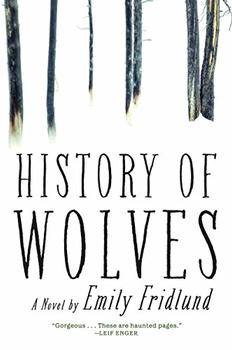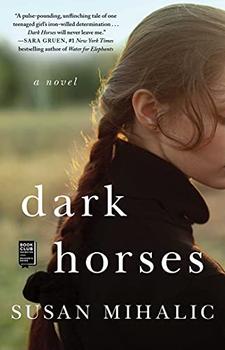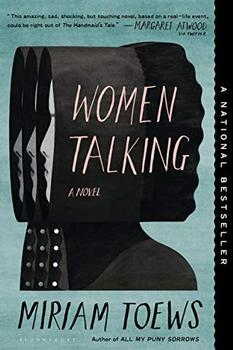Summary | Excerpt | Reading Guide | Discuss | Reviews | Beyond the book | Read-Alikes | Genres & Themes | Author Bio

Winner of the McGinnis-Ritchie award for its first chapter, Emily Fridlund's propulsive and gorgeously written History of Wolves introduces a new writer of enormous range and talent.
Fourteen-year-old Linda lives with her parents in the beautiful, austere woods of northern Minnesota, where their nearly abandoned commune stands as a last vestige of a lost counter-culture world. Isolated at home and an outlander at school, Linda is drawn to the enigmatic, attractive Lily and new history teacher Mr. Grierson. When Mr. Grierson is charged with possessing child pornography, the implications of his arrest deeply affect Linda as she wrestles with her own fledgling desires and craving to belong.
And then the young Gardner family moves in across the lake and Linda finds herself welcomed into their home as a babysitter for their little boy, Paul. It seems that her life finally has purpose but with this new sense of belonging she is also drawn into secrets she doesn't understand. Over the course of a few days, Linda makes a set of choices that reverberate throughout her life. As she struggles to find a way out of the sequestered world into which she was born, Linda confronts the life-and-death consequences of the things people do - and fail to do - for the people they love.
1
It's not that I never think about Paul. He comes to me occasionally before I'm fully awake, though I almost never remember what he said, or what I did or didn't do to him. In my mind, the kid just plops down into my lap. Boom. That's how I know it's him: there's no interest in me, no hesitation. We're sitting in the Nature Center on a late afternoon like any other, and his body moves automatically toward mine—not out of love or respect, but simply because he hasn't yet learned the etiquette of minding where his body stops and another begins. He's four, he's got an owl puzzle to do, don't talk to him. I don't. Outside the window, an avalanche of poplar fluff floats by, silent and weightless as air. The sunlight shifts, the puzzle cleaves into an owl and comes apart again, I prod Paul to standing. Time to go. It's time. But in the second before we rise, before he whines out his protest and asks to stay a little ...
Here are some of the comments posted about History of Wolves in our legacy forum.
You can see the full discussion here.
"What's the difference between what you believe and what you do?"
What you do is generally the outcome of what you believe. At a certain age we develop a conscience and we follow certain beliefs, knowing the consequences of our action. In this novel it is important to know how old was Linda when she was pondering... - reene
After she has become a part of Paul and Patra's daily routine, Linda still overstays her welcome some evenings and at one point lingers outside of their house, peering through their windows. Why do you think she keep watching them like this?
Linda lived in a home with other people, but there was very little interaction among them. Her father stayed outside in the shed doing his thing. Her mom sat in the dark sewing or working on other projects that she would not share with Linda. Her ... - acstrine
After spending all spring with Patra and Paul dressed as usual for the woods and school, why does Linda take such care in her preparations for the trip to Duluth?
Linda worries as much about what to eat as she does about what to wear. I think the approval and acceptance of Paul and Patra is important to her. For the first time since she was a child in the commune, she belongs to something. Linda recognizes ... - acstrine
Do you adhere to the faith you were raised in? Did you ever experiment with a religion that is out of the mainstream? Has your religious experience changed as you've aged?
IMO, Patra is a negative example of a religious follower: someone who adopts a religion not by way of a personal spiritual journey and genuine conviction, but for social reasons,such as to please someone (in her case, Leo), looking outside oneself to... - JLPen77
Does Linda's interest in Patra differ from her interest in Lily, and if so, in what way? Does Linda seem interested romantically in either of these characters?
I do not think think the interest in either Patra or Lily was romantic. Linda was emotionally stunted. She knew very little about authentic interactions with others based on her relationship (or lack thereof) with her own parents. Linda was an ... - acstrine
This is a compelling and unconventional narrative where we are asked to examine degrees of guilt and complicity. Is a sexual predator still a predator if he does not act on his impulses, guilty for what he merely thinks of doing? Where do we place neglect on the spectrum of harmful acts? History of Wolves is also unique because the main character is on the periphery of someone else's tragedy, yet no less impacted, no less a victim...continued
Full Review
 (528 words)
(528 words)
(Reviewed by Lisa Butts).
 Aimee Bender
What powerful tension and depth this provides! I'm so excited for readers to encounter the talent and roiling intelligence of Emily Fridlund.
Aimee Bender
What powerful tension and depth this provides! I'm so excited for readers to encounter the talent and roiling intelligence of Emily Fridlund. Ben Marcus, author of The Flame Alphabet
Winter collapsed on us that year. It knelt down, exhausted, and stayed.' So much is accomplished here, not least a kind of trust that this writer will make everything count, including the kind of data that is usually left for dead in a story. What is literary authority, after all, but the ability to regularly, without apparent effort, make the most of every sentence, build feeling in every line and do it in such a way that is tough, tight, funny, and often brilliantly disruptive?
Ben Marcus, author of The Flame Alphabet
Winter collapsed on us that year. It knelt down, exhausted, and stayed.' So much is accomplished here, not least a kind of trust that this writer will make everything count, including the kind of data that is usually left for dead in a story. What is literary authority, after all, but the ability to regularly, without apparent effort, make the most of every sentence, build feeling in every line and do it in such a way that is tough, tight, funny, and often brilliantly disruptive? Leif Enger
Emily Fridlund's language is generous and precise, her story grief-tempered and forcefully moving. History of Wolves is the loneliest thing I've read in years, and it's gorgeous. These are haunted pages.
Leif Enger
Emily Fridlund's language is generous and precise, her story grief-tempered and forcefully moving. History of Wolves is the loneliest thing I've read in years, and it's gorgeous. These are haunted pages. T.C. Boyle
As exquisite a first novel as I've ever encountered. Poetic, complex and utterly, heartbreakingly beautiful.
T.C. Boyle
As exquisite a first novel as I've ever encountered. Poetic, complex and utterly, heartbreakingly beautiful.Christian Science was founded in 1894 by Mary Baker Eddy as a means of embracing "primitive Christianity and its lost element of healing." The foundational text is Eddy's Science and Health with Key to the Scriptures, published in 1875, which Emily Fridlund references several times in History of Wolves.
 Mary Baker Eddy (1821-1910) grew up in a family of devout Puritans, and her early life was beset by hardship. She was frequently ill as a child, and as a young woman she lost both her brother and husband in a short span. Beginning in 1862, Eddy was in correspondence with Phineas P. Quimby, proponent of an early form of homeopathy. She combined Quimby's beliefs with her own religious convictions to create Science and Health and launch the ...
Mary Baker Eddy (1821-1910) grew up in a family of devout Puritans, and her early life was beset by hardship. She was frequently ill as a child, and as a young woman she lost both her brother and husband in a short span. Beginning in 1862, Eddy was in correspondence with Phineas P. Quimby, proponent of an early form of homeopathy. She combined Quimby's beliefs with her own religious convictions to create Science and Health and launch the ...

If you liked History of Wolves, try these:

by Susan Mihalic
Published 2021
A darkly gripping debut novel about a teenage girl's fierce struggle to reclaim her life from her abusive father.

by Miriam Toews
Published 2020
Based on real events and told through the "minutes" of the women's all-female symposium, Toews's masterful novel uses wry, politically engaged humor to relate this tale of women claiming their own power to decide.




Use what talents you possess: The woods would be very silent if no birds sang there except those that sang best
Click Here to find out who said this, as well as discovering other famous literary quotes!